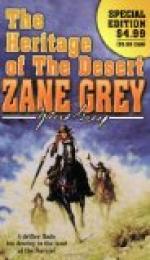“Eschtah has waited, yet Mescal has not come to him.”
“She has not been here?”
“Mescal’s shadow has not gladdened the Navajo’s door.”
“She has climbed the crags or wandered into the canyons. The white father loves her; he must find her.”
“Eschtah’s braves and mustangs are for his friend’s use. The Navajo will find her if she is not as the grain of drifting sand. But is the White Prophet wise in his years? Let the Flower of the Desert take root in the soil of her forefathers.”
“Eschtah’s wisdom is great, but he thinks only of Indian blood. Mescal is half white, and her ways have been the ways of the white man. Nor does Eschtah think of the white man’s love.”
“The desert has called. Where is the White Prophet’s vision? White blood and red blood will not mix. The Indian’s blood pales in the white man’s stream; or it burns red for the sun and the waste and the wild. Eschtah’s forefathers, sleeping here in the silence, have called the Desert Flower.”
“It is true. But the white man is bound; he cannot be as the Indian; he does not content himself with life as it is; he hopes and prays for change; he believes in the progress of his race on earth. Therefore Eschtah’s white friend smelts Mescal; he has brought her up as his own; he wants to take her home, to love her better, to trust to the future.”
“The white man’s ways are white man’s ways. Eschtah understands. He remembers his daughter lying here. He closed her dead eyes and sent word to his white friend. He named this child for the flower that blows in the wind of silent places. Eschtah gave his granddaughter to his friend. She has been the bond between them. Now she is flown and the White Father seeks the Navajo. Let him command. Eschtah has spoken.”
Eschtah pressed into Naab’s service a band of young braves, under the guidance of several warriors who knew every trail of the range, every waterhole, every cranny where even a wolf might hide. They swept the river-end of the plateau, and working westward, scoured the levels, ridges, valleys, climbed to the peaks, and sent their Indian dogs into the thickets and caves. From Eschtah’s encampment westward the hogans diminished in number till only one here and there was discovered, hidden under a yellow wall, or amid a clump of cedars. All the Indians met with were sternly questioned by the chiefs, their dwellings were searched, and the ground about their waterholes was closely examined. Mile after mile the plateau was covered by these Indians, who beat the brush and penetrated the fastnesses with a hunting instinct that left scarcely a rabbit-burrow unrevealed. The days sped by; the circle of the sun arched higher; the patches of snow in high places disappeared; and the search proceeded westward. They camped where the night overtook them, sometimes near water and grass, sometimes in bare dry places. To the westward the plateau widened. Rugged ridges rose here and there, and seared crags split the sky like sharp sawteeth. And after many miles of wild up-ranging they reached a divide which marked the line of Eschtah’s domain.




